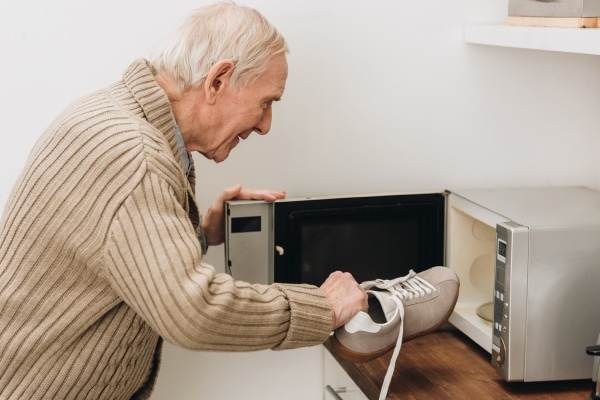Your Konnekt guide to
Caring for a Family Member with Dementia
Konnekt’s dementia care guide describes 5 evidence-based recommendations for caring for someone who has Alzheimer’s Disease, vascular dementia or other types of dementia. Each recommendation:
- describes what you can do to help, including practical advice;
- summarizes how it helps, with links to medical evidence; and
- suggests how to use a video phone to save time and check compliance.
Reading this guide will enable you to take practical steps and feel confident to:
- mitigate the frustrations of dementia;
- increase safety and independence; and
- actively help prolong health and wellbeing.
The guide is intended for sons, daughters, partners, other family members and close friends of someone at risk of dementia or suffering from dementia; visiting and live-in care providers; and Lifestyle Activities Coordinators and Diversional Therapists who are responsible for the activities programs within care homes and assisted living facilities.
In 2019, dementia was the leading cause of death among females, surpassing even heart disease.
Dementia impairs thoughts, communication, and memory. It interferes with the performance of everyday tasks and often leads to total dependence. Watching an elderly parent suffer and slowly die is frustrating and painful.
1. Does Diet Affect Dementia?
Diet is a controllable risk factor for dementia. Cut sugary foods and refined carbs, limit processed foods, avoid trans-fats, increase omega-3 fats, enjoy fruit and vegetables, drink 2-4 cups of tea daily, and keep alcohol to a minimum.


Poor diet is linked to inflammation, which injures neurons; being overweight doubles Alzheimer’s risk. Correct diet can lower the risk of diabetes, which inhibits communication between brain cells, and healthy fats may reduce beta-amyloid plaques.
Dementia can take away your loved one’s ability to shop for ingredients, prepare healthy foods safely, stay hydrated, and maintain self-control. You may need to take an increasingly active role in your parent’s diet. If you can’t visit, Skype (which we recommend for reliable video-calling) is a great way to check what they eat and ensure they drink enough water.

2. Blood Pressure and Dementia
Reduced physical activity, poor diet, poor sleep habits, feelings of loneliness and social isolation are all associated with increased blood pressure. Without monitoring, those at risk of dementia are more likely to neglect this aspect of their health.
Health professionals recommend to test blood pressure every 1-2 years or more often if there are risk factors or medication changes.


High blood pressure can damage and narrow brain blood vessels, increasing the risk of blocked or burst blood vessels, leading to cell death. Known as vascular dementia, this affects memory, thinking, and language skills. Hypertension is also associated with tangles of tau protein, a hallmark of Alzheimer’s Disease.
Medication can help reduce blood pressure easily. However, dementia patients often forget to take their tablets.
Pharmacies can home-deliver medication in “blister packs”. Talking alarms and smart pill dispensers help some, but dementia patients are notorious for ignoring reminders. Skype is ideal for encouraging and watching your parent take medication and to guide the correct use of a home blood-pressure machine.
Ultimately, a visiting nurse may be required to ensure compliance.

3. The Importance of Exercise
Health professionals recommend 150 minutes of moderate-intensity exercise a week, combining cardio with strength training.
Physical activity stimulates the brain’s ability to maintain old connections and to form new ones. Strength/balance training has the added benefit of reducing the risk of falls.


Seniors have fewer visitors to encourage physical exertion, fewer interests that require movement, and a greater risk of falling. Moreover, dementia destroys the motivation to exercise.
You can organise regular walks, such as shopping trips. The local gym, seniors club, seniors day centre or aged care facility may run classes specifically for the elderly. Gardening should be encouraged as long as there is sufficient mobility.
See Konnekt’s article Safe Exercises for Elderly Adults for exercise tips and practical ideas.
In a 2016 medical study, seniors showed improved health in just 12 weeks of instructor-led tele-exercise over Skype. In the US, Virtual Seniors Centers now offer tai-chi and exercise classes. If your parent is house-bound, family members can take turns to lead “Gran” through some simple home exercises.
Talk to the GP for advice on the right level and forms of exercise, and ideas on local social exercise activities for seniors.
4. The link between Depression and Dementia
It can be difficult for the family to notice gradual changes in mood and personality. Dementia patients may be suffering inwardly but unable to properly verbalise. Surveys have shown that 50% of those in aged care have at least one symptom of depression.
Depression episodes have an actual physical effect on the brain. Depressed older adults are 65% more likely to develop Alzheimer’s and more than twice as likely to develop vascular dementia.


Manage an existing depression condition by taking your elderly parent to a mental health professional regularly, and ensuring that prescribed medication is never missed.
Social isolation and loneliness are linked to depression. Read how face-to-face conversation halves depression risk, when performed at least three times per week, as backed by recent OHSU studies. The most recent study showed the same benefits of regular contact via Skype! Video calling is an excellent way to increase face-to-face contact, especially for those who do not see family and friends daily. Konnekt’s Videophone features are ideally suited to this purpose.
5. Staying Mentally and Socially Active
Keeping the brain active is thought to build reserves of healthy brain cells and connections between them, and new research suggests that social engagement may be the best form of mental stimulation.
A Global Council of Brain Health report and a 2018 British medical study concluded that brain-training games, sudoku, and crossword puzzles do not help protect the mind from dementia:
Brain-training games have little benefit for brain health and memory, and people should concentrate on socialising

Verbal communication exercises memory, linguistic skills, attention, executive function, and abstract reasoning.
Face-to-face conversation significantly adds to this. It exercises visual processing, pattern recognition, interpretation of facial and body language that convey meaning and emotion, and the coordinated use of gestures which are linked to psychomotor skills.
An OHSU study shows that increased social interaction via face-to-face calls could be a promising intervention for improving cognitive function. Study participants had measurably improved brain function after just six weeks of daily video calling.
During your visit or video call (virtual visit), boost mental stimulation and activate memories by:
- Recalling past events and family gatherings;
- Playing music and sounds associated with early memories;
- Engaging in show-and-tell activities using familiar objects or photos.
Key Takeaway – Social Engagement is Vital!
Face-to-face conversation with family & friends – both in-person and via video calling – can make a real and measurable difference. It hits every recommendation in this guide:
- Depression episodes are more likely to be noticed
- Blood pressure medication compliance can be monitored
- Family are likely to encourage exercise and a healthy diet
- Face-to-face communication exercises the brain, and preparation requires physical activity such as grooming.
Face-to-face social engagement is vital for those at risk of dementia or suffering from dementia.

How the Konnekt Videophone can Help
The Konnekt Videophone is designed specifically for those with dementia — read here how it works. Family members can stay on top of dementia risk factors more easily and follow the recommendations in this guide.
One Touch to Social Engagement
Videophone requires just one press to connect. Initiate calls or answer calls with a single tap of the easy-to-see buttons on the large touchscreen. Mastery of the superbly easy user interface will increase self confidence and encourage greater social engagement.
Automatic Health Check
Unanswered calls from family lead to frustration and fear. Konnekt’s Auto Answer feature allows family to check-in remotely and keep an eye on sleep habits. Read how automatic answer helped save a life.
Life-like Show and Tell
Videophone’s large touchscreen allows life-like conversation. You can lead exercise sessions, share your own screen, or show and discuss familiar objects.
Invite the Whole Family to Help
Share the care of your family member. Konnekt Videophone allows you to easily join family in a group video call. Share virtual meals, virtual vacations and family memories. Encourage family to help monitor hydration compliance and encourage healthy eating.
Help your parent prolong their independence, avoid social isolation and mitigate the risks of depression and dementia; find out if a video phone is the right thing for your loved one, or maybe an iPad or seniors mobile would suit you best!
Remember, every dementia case is different, and our senior experts at Konnekt have experience supporting hundreds of patients, carers and families.
Our mission is to minimize the development and impact of dementia, and save you hours of research. During our free 15-minute consultation we will help you:
- Understand available communication aids that help with dementia, hearing loss, physical and mental impairments
- Pick the right assistive technologies for your parent
- Tap into government funding
Konnekt exists to ease the suffering of families, by supplying the world’s easiest-to-use video phone, to meet the challenges of ageing, hearing, mobility and cognitively impaired individuals.
Or contact your nearest Konnekt sales and support partner to find out more about Konnekt’s Videophone for dementia patients.
